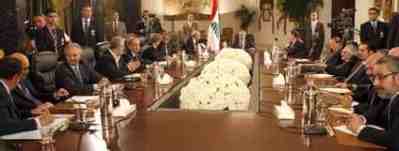 BEIRUT (AFP) Lebanon's rival factions launched national reconciliation talks on Tuesday to resolve lingering disputes after a crisis that brought the nation to the brink of civil war, with the thorny issue of Hezbollah's weapons topping the agenda. The talks bring together 14 political figures from the country's pro- and anti-Syrian camps who agreed to try to mend fences following a Qatari-brokered deal in May that put an end to a damaging 18-month political crisis. "Agreeing to dialogue in and of itself means that all subjects are open to discussion," President Michel Sleiman said as he opened the talks. "The only thing banned here is failure or a reaching a dead-end."
BEIRUT (AFP) Lebanon's rival factions launched national reconciliation talks on Tuesday to resolve lingering disputes after a crisis that brought the nation to the brink of civil war, with the thorny issue of Hezbollah's weapons topping the agenda. The talks bring together 14 political figures from the country's pro- and anti-Syrian camps who agreed to try to mend fences following a Qatari-brokered deal in May that put an end to a damaging 18-month political crisis. "Agreeing to dialogue in and of itself means that all subjects are open to discussion," President Michel Sleiman said as he opened the talks. "The only thing banned here is failure or a reaching a dead-end." The main focus of the dialogue will be on forging a defence strategy for Lebanon but there is widespread scepticism that an agreement can be reached given deep-seated divisions over Hezbollah's weapons arsenal. The Shiite Muslim group, considered a terrorist organisation by the United States, has refused to disarm arguing that its weapons and guerrilla army are essential to defend the country against neighbouring Israel. However members of the Western-backed majority in parliament argue that Hezbollah's weapons undermine the authority of the state which should be the sole decision-maker on matters of defence.
"All Lebanese are hoping that the dialogue will be successful but a real solution will only be found when Hezbollah stops using its weapons to serve regional interests and stops imposing its hegemony by force on the local scene," said an editorial in An-Nahar newspaper, which is close to the anti-Syrian ruling coalition in parliament. Newspapers close to the rival camp backed by Syria and Iran said those taking part in the dialogue face an arduous task given their differences. "The various political camps believe the discussions on the national defence strategy will get bogged down into futile debate and no one will see any results for a long time," the As-Safir newspaper said. The independent Al-Anwar said the closed-door talks were taking place "in a minefield called Lebanon, with the mines produced locally and abroad." The dialogue follows on from a 2006 initiative in which the same 14 factions held several round-table meetings in a bid to forge political unity. But there have been heightened security concerns in the country following the killing last week of a pro-Syrian politician in a car bombing and a number of violent incidents. Six makeshift bombs exploded early on Monday in a mixed Sunni-Shiite area of west Beirut and two similar bombs were defused by the Lebanese army near a church north of the capital. Tuesday's talks are to set the agenda and timetable for talks, with the next session set to take place after Sleiman returns from a visit to the United States later this month.
The opening session was participated by 14 Lebanese political leaders. Arab League chief Amr Moussa also attended the meeting.
In his opening address, President Suleiman stressed that "frankness and reconciliation lead to the building of a strong state", calling for "sacrifices and concessions in favor of Lebanon."
"Lebanon survives on dialogue and should maintain this trend" Suleiman stressed.
About the main topic of the national dialogue, the controversial issue of the defense strategy, Suleiman said that discussion the defense strategy is a long process.
"I am confident that we can adopt a strategy to defend Lebanon based on benefiting from the capabilities of the resistance," he said, meaning Hezbollah.
The president, meanwhile, urged the local media to back dialogue and facilitate national unity, saying that "the dialogue atmosphere would promote the speedy adoption of the election law."
The new election law for 2009 parliamentary elections should be ratified before the end of September, which is the third phase of the Doha accord signed on May 21 by the rival political leaders.
The first phase ended in the election of President Suleiman and the second was the formation of a national unity government.
Source:Xinhua
The statement issued after the three-hour meeting added that the president would mediate bilateral talks in the meantime to "consolidate the reconciliation".
The main focus of the dialogue is on forging a defence strategy for Lebanon but there is widespread scepticism that an agreement can be reached given deep-seated divisions over Hezbollah's arsenal.
The participants agreed to "launch talks on a national defence strategy... to reach a shared vision on this strategy," the statement said.